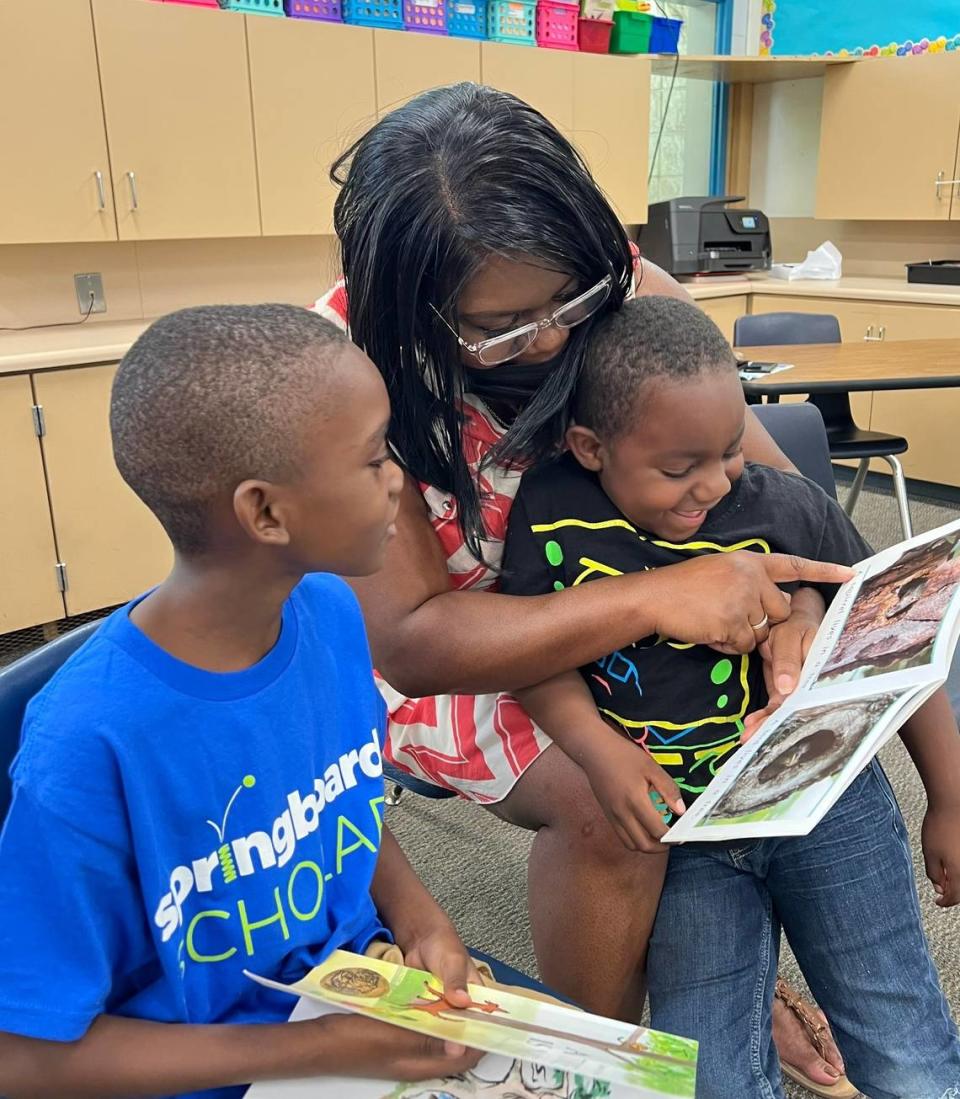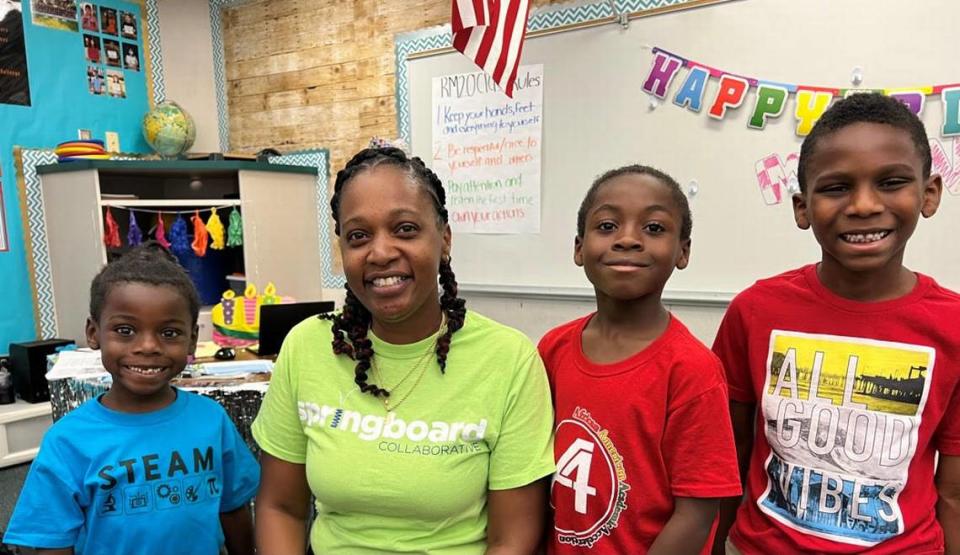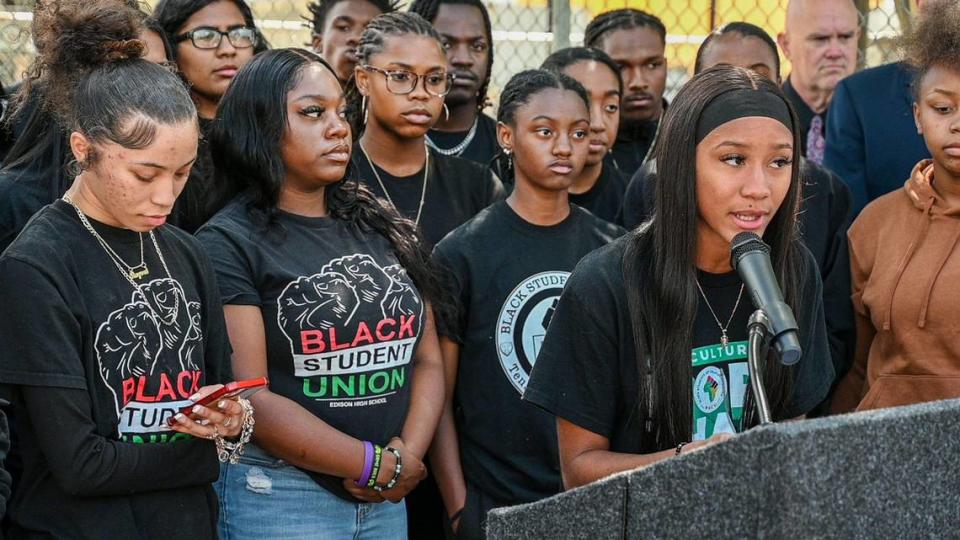‘We started a movement.’ Fresno Unified’s plan to end achievement gap for Black students
Education Lab Newsletter
Get stories that matter on education issues critical to the advancement of San Joaquin Valley residents, with a focus on Fresno. Sign up, and join the conversation.
Year after year, Black students in Fresno Unified schools have struggled academically more than any other group.
In 2017, 86% of Fresno’s Black students failed to meet California state math testing standards, and 79% tested below state reading standards, according to the state’s assessment results. By comparison, nearly 58% of white students failed to meet the math standard and about 48% didn’t meet the standard in reading.
FUSD Deputy Superintendent Misty Her said those numbers motivated the district to establish a new department to focus on eliminating the achievement gap for Black students.
“This is more than a couple of field trips or a camp,” Her said. “This is figuring out why our kids are failing.”
Her said the department was created to “urgently address the fundamental causes” of those gaps with a “focused attention” on the academic needs of Black students.
And while the district’s Black students remain behind other ethnic groups, in 2019, two years after FUSD launched its African American Academic Acceleration Department, state records showed the achievement gap for the district’s Black students shrinking on state tests, if only by a few percentage points.
A4 students and parents who spoke with The Bee’s Education Lab said collaboration between teachers and families in the program is vital, and lessons are built specifically for Black students.
“They made it fun for the kids,” said Vinnessa Johnson, who has two children and two nieces participating in A4 programs.
Test scores were set back during the pandemic among the district’s Black students, many of whom were chronically absent after classes moved online.
Still, students and teachers said the foundation established by the A4 program and other recent efforts show a concerted effort to improve outcomes for Fresno’s Black students.
“We’re trying to change the narrative of what people are used to seeing on TV and in the media about African American people, in general,” said Jasmine Burris-Marby, who began teaching with the A4 program three years ago. “It’s about changing that perception and seeing and supporting the person in front of them.”

Students grow as they have fun, learn about their culture
Vinnessa Johnson’s two children and two nieces thought reading was boring.
But she said the kids read more than 25 books this summer while participating in A4. They learned to summarize the books and said the fun literacy program taught them about African American culture and history.
All the books A4 provides have characters that look like the students.
Keyshon Muhammod, 10, likes how the program focuses on reading. And it’s helped his confidence. The more he reads, he said, the less he stutters.
“I’ve been reading a lot of books and learning more words,” he said.
Keyshon enjoys seeing his friends, but he loves the prizes, like the watch he won for reaching his reading goals.
Khadijah Muhammod, 9, likes how she’s becoming a better reader. Without hesitation, she said reading is her favorite part of the program.
Their mother, Keishawna Caradine, said her three children showed improvement each year they participated in A4 programs at Thomas Elementary.
Of the K-5 students who participated in the reading program in 2021, 67% showed growth, Her said.
Wendy McCulley was the first executive director of A4. She said part of the program’s success stems from bringing families into the learning process as partners. Parent participation was measured at 98% during the district’s 2021 summer program, she noted.
Johnson learned techniques to help her children and nieces grow as readers at home. The parent workshops were worth it for her children to improve in reading and for her to get insight into ways to help her children comprehend better.
“We teach the parents how to extend what the teacher is teaching: how to teach your kids to read,” McCulley said. “It takes that partnership.”
That alone helps change stereotypes about Black families and empowers parents to be engaged, she said.
Her said the workshops help change the way parents ask questions; parents go from putting all their trust in teachers to asking what they can do to specifically help their children.
‘Teachers are able to give them exactly what they need’
Where are the gaps? What are students struggling with?
Those became the guiding questions for A4 when it was established in 2017.
As A4’s executive director in its first years, Wendy McCulley, now the chief of external partnerships, looked at the data to understand why so many Black students were failing and then formed academic-focused programs.
“I took academic acceleration very literally,” McCulley told The Bee’s Ed Lab.
The district needed a specific approach, so the data-driven McCulley stayed with academics, which started with a summer literacy program that has expanded from being at one school site to being districtwide each summer and at nine school sites throughout the year.
Burris-Marby has been a teacher for 12 years, including the last three on a special assignment with A4.
What’s unique about both the afterschool and summer school literacy program is that students are placed in classes based on their reading level, not by their grade level, Burris-Marby said. Teachers can spend all of their time on the specific areas students need.
“Teachers are able to give them exactly what they need,” she said, “instead of what we think they need to make gains.”
Even though Black students remained at the bottom of Fresno Unified in state testing in 2019, they showed an overall improvement with the percentage of Black students meeting state standards increasing by more than 3% in math and reading.
In 2021, a year after the pandemic started, those gains either returned to pre-pandemic percentages or remained stagnant. Based on the California Assessment of Student Performance and Progress, nearly 90% of Fresno’s Black students failed to meet state math testing standards, which was worse than the 2017 percentage. And 75% tested below state reading standards, which remained about the same from 2019.
The pandemic caused some of those academic setbacks.

Fresno teachers learning how to connect with Black students
A4 also trains educators on ways to teach, encourage and empower their Black students.
Teachers have said the training provided through A4 helped them become better educators, according to Burris-Marby.
“African American students need to be able to trust them; students need to be able to feel they have a relationship with their teachers,” she said. “This helps them to want to be at school, want to do their work and want to do their best.”
The department trains teachers throughout the school district as well about creating a sense of belonging and fostering meaningful relationships with Black students, she said.
“Get their names right, respond to their questions, learn about their family, greet them when they come in, set expectations,” she said. “Let them know they are important; let them know they are an asset to the class.”
Oftentimes, educators said they just didn’t know how to build those relationships until the training. But it’s student-teacher relationships that give teachers the ability to engage their students, Burris-Marby said.
Burris-Marby is transitioning into the vice principal role at Edison High School. She credits a lot of her growth as an educator to A4 and the professional development on how to work with Black students and families.
But there’s a long road ahead for Fresno’s Black students
In 2019, two years after A4 was established, a FUSD task force described the district’s overall environment for Black students as a “state of emergency.”
As a result, FUSD schools have refined or developed programs for their Black students.
Before A4, the approach to closing the achievement gap depended on each school’s investment. And often, those lessons focused on remediation and didn’t challenge African American students as the powerful learners they are, Her said.
Now each school is held accountable.
“We started a movement,” McCulley said. “Because of the work we did in the task force, we now have more Black principals.”
And the district is working on getting more Black teachers and staff in front of their students.
Black students who have at least one Black teacher between kindergarten and third grade are 7% more likely to graduate from high school and 13% more likely to enroll in college, according to a November 2018 study by the National Bureau of Economic Research.
Her said A4 raised awareness as leaders became more comfortable discussing Black student achievement and calling out the systemic issues at Fresno Unified schools.
“Having the department allowed us to outwardly have conversations about systemic issues that people would shy away from,” she said.
While McCulley is unsure if systemic issues and racism will ever disappear, FUSD has worked to ensure each employee receives cultural proficiency training.
But it’s a work-in-progress, district leaders acknowledged.
In 2019, the most recent graduation data available from the state, 80.2% of Black students graduated compared to 88.3% of white students, 87.8% of Hispanic students and 91% of Asian students.
“The clarity around what we’re going to do for our African American students, how we’re going to treat them, our investments towards them, and here are all our documents to back that up,” Her said. “I don’t think we’re there.”

What’s next?
Changing the district’s climate for Black students isn’t just about improving statewide test scores.
On Thursday, FUSD Superintendent Bob Nelson announced a first-of-its-kind partnership between Fresno schools and Benedict College, a historically Black college in Columbia, South Carolina.
The HBCU Step Up Pathways Program allows Black students at Sunnyside, Edison and Bullard high schools to earn up to 12 free college credits through online classes led by Benedict professors, Nelson said in a news release.
News of the programs comes just weeks after FUSD officials hosted a news conference to push California Gov. Gavin Newsom to support new legislation allowing schools to spend more money to improve test scores and graduation rates for their lowest-performing students.
FUSD leaders and students said the legislation, AB 2774, would help the district beef up programs for Fresno’s Black students.
“This bill sets up a sustainable funding model that we can use ongoing to make sure that this work never dies in our system,” Nelson told reporters in July.
Myles Lee was a 2022 valedictorian at Edison High School. He attended the July news conference to show his support for the legislation.
Lee talked about the importance of changing the narrative around Black students in Fresno. He said school was about more than athletics for him but said he felt more pressure to get a sports scholarship than to earn a college degree.
Lee said school districts must close the gaps and eliminate stereotypes that affect students who look like him.
He noted in July the legislation to help the state’s lowest-performing students had failed to gain traction in Sacramento twice before and said students and families were “fed up.”
“There needs to be a change,” Lee said.
Others agree. Such programs would create more opportunities, like the FUSD A4 program, that invest in Black students.
“We need to see our scholars in a different kind of way in our classrooms,” Margaret Fortune, the president of Fortune School of Education and sponsor of the bill, said. “And what does that take? Focus, investment, accountability. The work is happening. The field is ahead of policy.”
Test scores? Racism? Cellphones? What are the biggest issues facing Fresno schools?
The Education Lab is a local journalism initiative that highlights education issues critical to the advancement of the San Joaquin Valley. It is funded by donors. Learn about The Bee’s Education Lab at its website.

